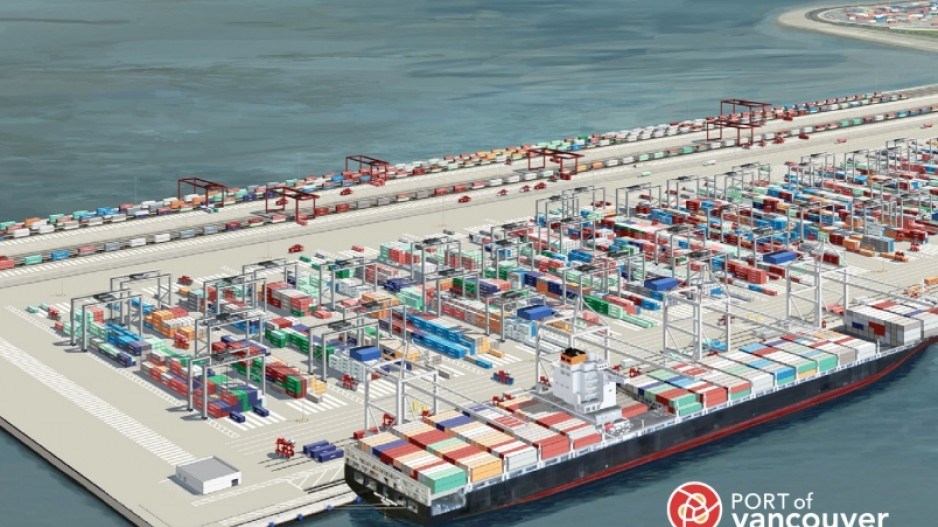While a rival proposed project at the same site is now facing opposition, the path to approval for the larger Terminal 2 container port facility at Roberts Bank is not getting any smoother.
On December 14, community and environmental activist alliance Against Port Expansion Group said it has presented an 1,861-signature e-petition to Parliament, asking Ottawa to reject the project championed by the Vancouver Fraser Port Authority.
Roger Emsley, the group’s executive director, said the e-petition collected signatures from project opponents not only in B.C. but also in seven other Canadian provinces and two territories. He added that the petition’s timing “could not be better” because Terminal 2 (RBT2) opposition is increasing on several fronts, including from the Richmond and Delta municipal governments.
He added that the port authority has also announced that it will delay its response to the federal environment minister’s request for more information regarding RBT2.
“Why the delay? What are they scared of?” Emsley said. “The environmental assessment for this project has been ongoing for seven years. If the port cannot finally get its story complete, then surely it is time for the government to say enough is enough and close the project down.”
The port authority has said it remains confident that the federal ministry will find the response satisfactory in supporting Terminal 2.
“The revised timeline incorporates feedback we heard during our consultation on the information request response process with Indigenous groups and considers ongoing developments related to COVID-19,” port authority vice-president of infrastructure Cliff Stewart said in a November letter to Ottawa explaining the need for the six-month delay in providing additional information on the project’s environmental impact.
“We remain committed to doing what we can to make sure the project is built in time to support Canadian importers and exporters who rely on the Port of Vancouver to get their goods to and from Asian markets, while also balancing the importance of protecting the local environment and considering communities.”
Terminal 2, which carries an estimated price tag of between $2 billion and $3.5 billion, is aimed at servicing the projected increase in transpacific container traffic for Canada’s West Coast through to the mid-to-late 2030s, according to the port authority.
The project involves creating a new island for the terminal, which would have an initial capacity of 1.6 million 20-foot equivalent units (TEU) once construction is completed in 2029, before expanding to 2.4 million TEU.
But opponents say ongoing expansion at Prince Rupert’s Fairview Terminal – as well as internal efficiencies such as operating additional lots inland with expanded hours – should be enough to support current container traffic.
Emsley said the scaling down of industrial work would preserve one of the last pieces of the Fraser River estuary, which is vital to birds and marine wildlife migration patterns.
Complicating the matter further is the Deltaport Berth 4 project that has been initiated by GCT Global Container Terminals Canada, the operator of Roberts Bank’s GCT Deltaport container terminal.
GCT wants to expand its Roberts Bank operations and has been one of the loudest Terminal 2 opponents, saying that the port authority has shown a conflict of interest in shunning GCT’s incremental capacity expansion plan in favour of its RBT2 project.
But some local environmental groups have expressed opposition to any further development at Roberts Bank.
In March, an environmental review panel said it found significant environmental issues with the RBT2 plan, but added that the project posed no technical challenges and is consistent with Canada’s mission to be a trading nation. Federal Environment Minister Jonathan Wilkinson, however, said the panel report raised enough questions about the port authority’s efforts to reduce RBT2’s impact on fish habitat that the ministry will require it to file additional information on those efforts – as well as employment estimate updates.
The port authority said that, despite the delay, it has no problem providing the information to ensure all concerns are addressed.
Emsley, however, is hopeful that, as more time passes and RBT2 opposition grows, Ottawa may see the plan as unnecessary and too costly.•



